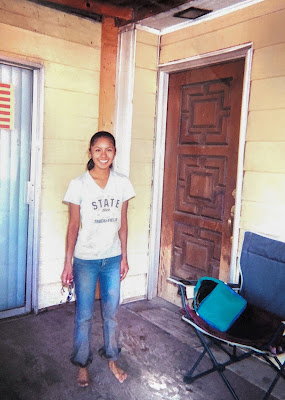 |
| Zuni Sustainable Ag Internship |
As with most college students it was a time of intense growth and personal struggles. I am now aware that as a first generation student to go to college how much pressure and lack of preparation I had. I often felt alone, lost and unable to voice my emotions during my college years. I found solace in the environmental science department and especially in my professor's (Gary Weissmann) attention to the fact that I was intelligent. He could see that I was struggling but was also aware that the university system was completely negating the learning styles of a diverse student population. I joined my professor’s research team after I took his Hydrogeology course. My final research project was titled: Agricultural Methods of Zuni Pueblo: Harvesting Water and Soil.
I knew then how crucial indigenous knowledge was in all aspects of environmental stewardship and conservation, but the intrinsic knowledge that indigenous people carry is a lot harder in convincing the more formal scientific approach of peer reviewed journals, scientific experts, etc. I was conducting other research related to hydrogeology, but I found more passion in what the sustainability studies classes were bringing me. I was part of the yearly planning of the UNM’s Sustainability Expo and from there my agricultural passion started to shine more as well. Here you can find a link to a blog write up about Zuni Waffle Gardens that I wrote for that class. https://abqstew.com/2016/04/20/the-benefits-and-age-old-success-of-waffle-gardens-a-history-on-one-of-the-oldest-sustainable-farming-methods-of-the-southwest/ One of my influential teachers in sustainability studies was Jessica Rowland. In my opinion she has provided more of her students towards a natural shift in earth stewardship and sustainable careers than anyone I know. Her influence was built on not just learning, but in action. At this point I was solidified in my longing for a more hands on experience with agriculture. A few years later I found myself in a farmer training and business acceleration program that would shape my individual passion for agriculture, but my deep rooted agricultural connection that I am still seeking to strengthen in my local community and more so in my Zuni Community. At this moment, I am truly grateful for the lovely and empowering connections I have made with other people that are dedicating their life and work to creating more communities centered around agriculture and its ability to create equality and wealth that goes far beyond economic impacts. I am confident that the choices I have made to get me to this point have all been worth it. Follow your passions, align with a supportive community and keep showing up for yourself in doing the work that gets you closer to your goals. More of my agricultural journey to come.

Comments
Post a Comment